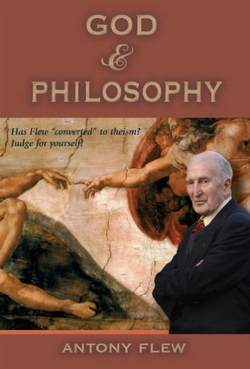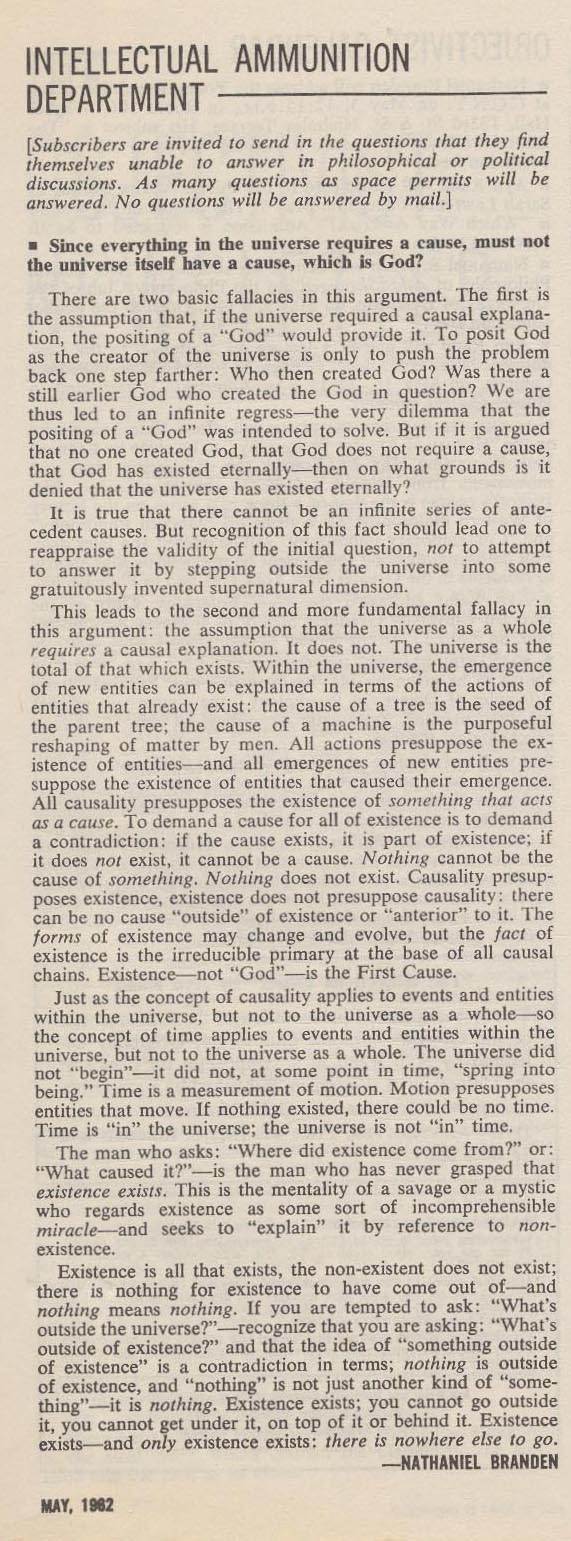An audit of the case for Christian theism
by Antony Flew
 In the course of my own intellectual, philosophical, and spiritual development, the issue of the Christian god—or God, if you prefer (conceding the initial cap as a means of indicating its monotheistic nature)—has been central. Partly because I was raised to believe in God and then partly because my libertarian political convictions emerged so strongly during my late teens… and they revolved about the writings of Ayn Rand (a quintessential atheist). [You can read Nathaniel Branden’s short column in the May 1962 Objectivist newsletter, which I’ve uploaded here as a jpeg file, which gives perhaps the most concise demolition of the logic behind the concept of God, at least as a ‘first cause.’]
In the course of my own intellectual, philosophical, and spiritual development, the issue of the Christian god—or God, if you prefer (conceding the initial cap as a means of indicating its monotheistic nature)—has been central. Partly because I was raised to believe in God and then partly because my libertarian political convictions emerged so strongly during my late teens… and they revolved about the writings of Ayn Rand (a quintessential atheist). [You can read Nathaniel Branden’s short column in the May 1962 Objectivist newsletter, which I’ve uploaded here as a jpeg file, which gives perhaps the most concise demolition of the logic behind the concept of God, at least as a ‘first cause.’]
God and Philosophy was one of the key books that I read on the subject of theism vs. atheism in the early 70s. Along with the classic out-of-print tome by Homer W. Smith, Man and His Gods (1952)—and I had heard of George Smith’s The Case Against God a few years later, as well—G&P gave pretty much the whole picture of why the concept of God (AS DEFINED BY THE CONVENTION OF THE BOOK OF COMMON PRAYER) is a nonstarter. The parenthetical phrase is extremely important, it’s the definition of terms that is necessary before any fruitful argument or discussion can follow. So the standard definition of God that Flew stipulates is as follows:
“The first of the 39 Articles of Religion, found at the back of The Book of Common Prayer [a product of the English Reformation that contains the words for services of worship, major parts of which are adopted by main Christian denominations], reads: ‘There is but one living and true God, everlasting, without body, parts, or passions, of infinite power, wisdom, and goodness, the Maker and Preserver of all things both visible and invisible….’ It means ‘a Being which is unique, unitary, incorporeal, infinitely powerful, wise, and good, personal but without passions, and the maker and preserver of the Universe.’ This is and is intended to be a minimal definition.”
Then Flew shows that the definition of God precludes such a being’s existence because one attribute contradicts another or some attributes, e.g. infinitely powerful, are self- contradictory in and of themselves. For example, an all-powerful, all-knowing God is impossible because if God were all knowing, God would know the future… which would be a limitation on God’s power (God could not do anything that changed the future he knew). Therefore, those two attributes contradict each other and God, as defined, does not exist. By nature, contradictions cannot exist. It’s your basic rules of reality.
 Truly, that’s the end of the exercise. Flew is perhaps the most erudite and purely logical mind I’ve had the privilege of running into, expressing his arguments with a humor and efficiency that knows few equals. Yes, the professor does continue to deal with each of the problems of definition one by one. Then homes in on the ontological argument, the argument from design, the argument from first cause, etc. As a practical matter, and as Branden points out, when you posit that God causes or does anything to the universe as a whole FROM OUTSIDE THE UNIVERSE, you have just stated that God does not exist in the universe (the totality of everything that exists). Ergo God, as defined, does not exist.
Truly, that’s the end of the exercise. Flew is perhaps the most erudite and purely logical mind I’ve had the privilege of running into, expressing his arguments with a humor and efficiency that knows few equals. Yes, the professor does continue to deal with each of the problems of definition one by one. Then homes in on the ontological argument, the argument from design, the argument from first cause, etc. As a practical matter, and as Branden points out, when you posit that God causes or does anything to the universe as a whole FROM OUTSIDE THE UNIVERSE, you have just stated that God does not exist in the universe (the totality of everything that exists). Ergo God, as defined, does not exist.
Basically, the remainder of the book is for fleshing out purposes, and scholarly comments.
From a logic standpoint, God and Philosophy is Demolition 101 on ‘God as defined.’ But we all know, too, that people define God in a number of ways—not always according to the Book of Prayer. [Indeed, Professor Flew, himself, 20 years after writing God and Philosophy, wrote a book, There is a God, seeming to counter the arguments of God and Philosophy. That isn’t the case at all. In the latter book he simply redefined God as an identity with nature, per the Deists or similar belief systems, then showed why it makes perfect logical sense to refer to nature or the universe or the life force, what have you, as a deity. That’s a different exercise altogether.
The moral of the story is, if someone asserts the existence of God and you wish to question it, the first order of business is to find out what definition the person is using. Plus, you’ll have a much more pleasant discussion. As a practical matter, most people use God as their term for a highest ideal of some sort, the existence of which even atheists accept. For the handful of people who want to see God as a supernatural (outside nature) entity, God and Philosophy is a powerful antidote.
This post has been read 1597 times!

